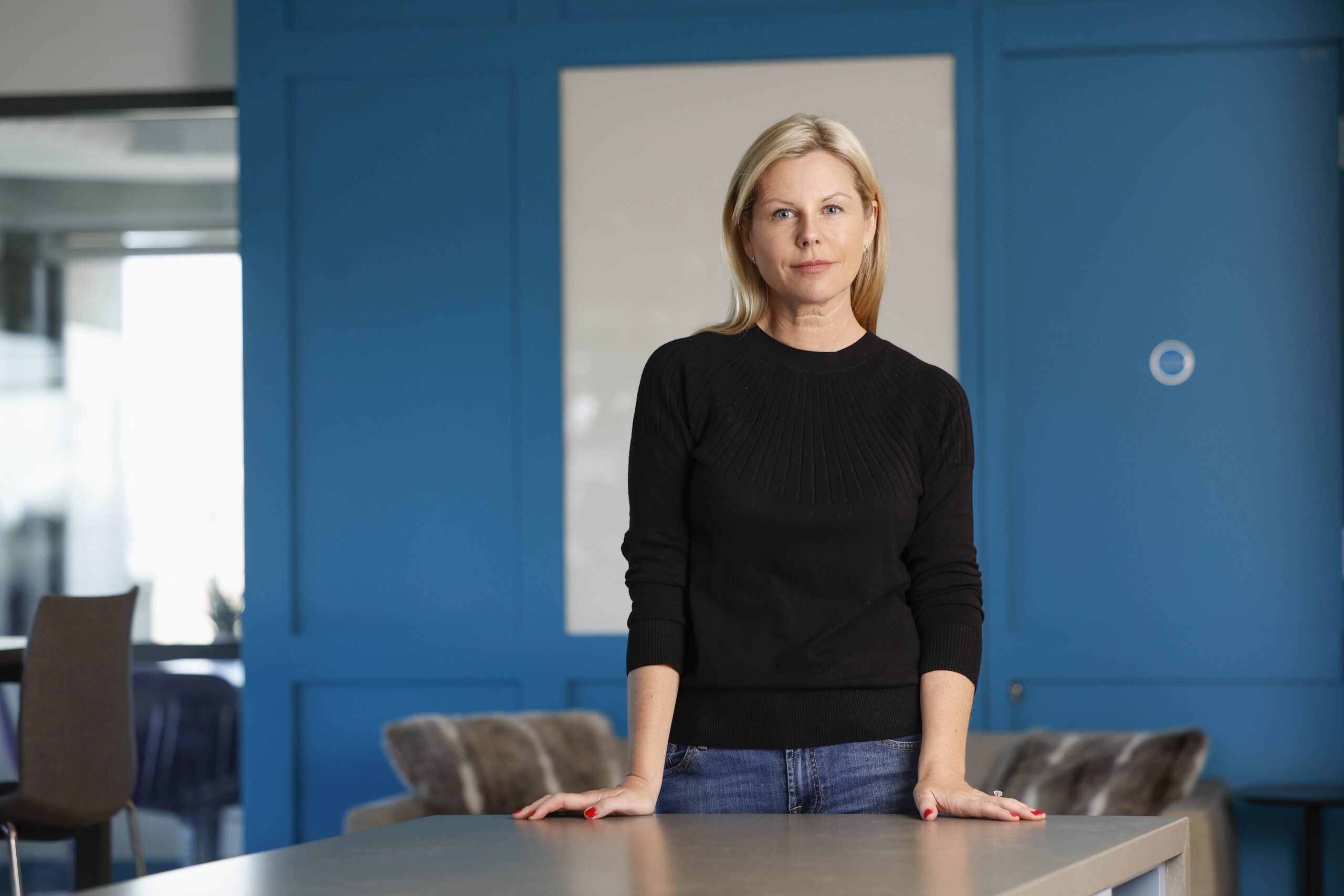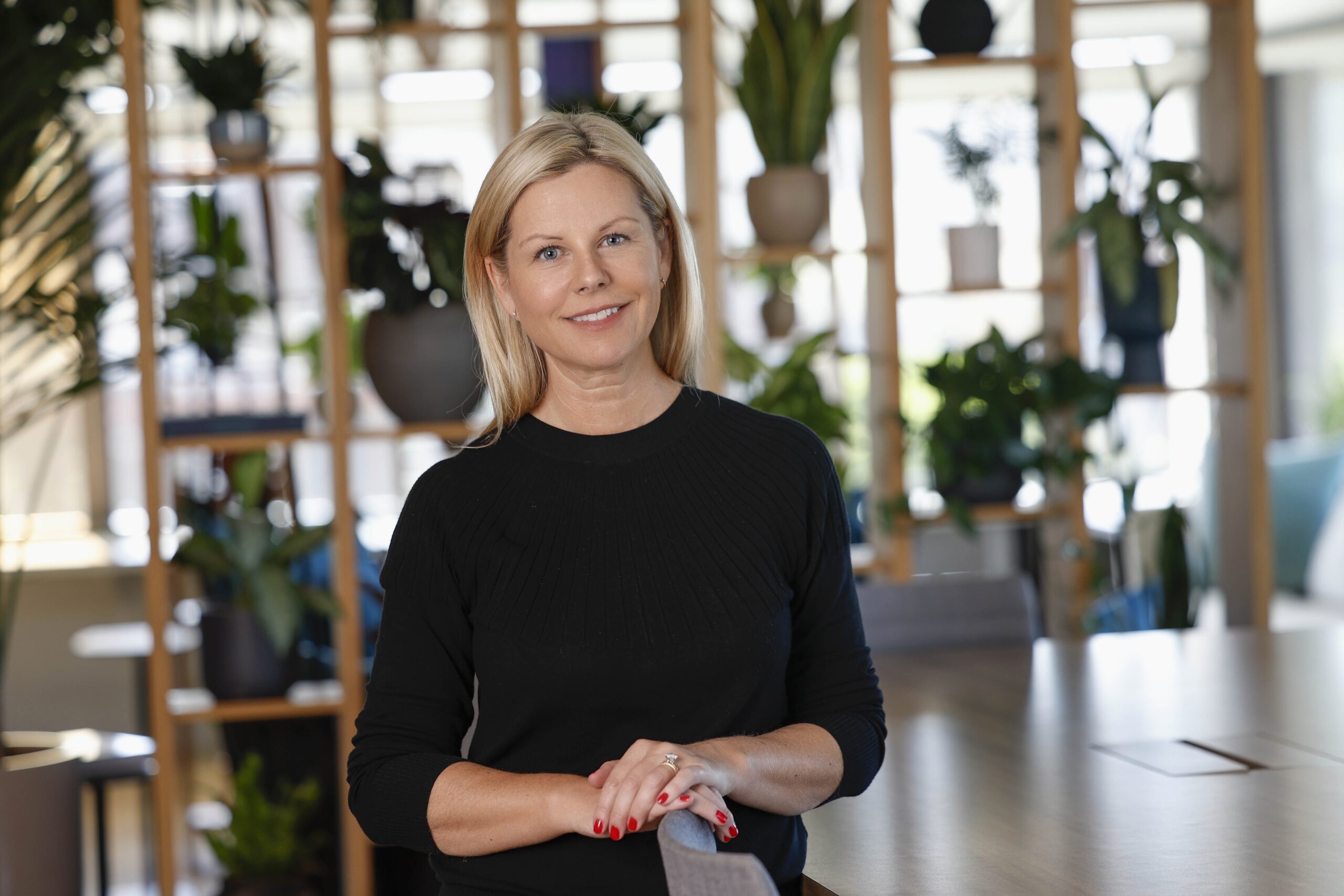
Cois Coiribe is pleased to present an interview with Eileen O’Mara, Head of EMEA Revenue & Growth at Stripe as conducted and transcribed by University of Galway’s College of Business, Public Policy and Law Communications Officer, Meadhbh McNutt. In the fast-evolving landscape of financial technology, few embody the spirit of leadership and innovation like University of Galway alumna, Eileen O’Mara. As chief revenue officer at Stripe, Eileen leads a global team that helps millions of companies – from the world’s largest enterprises to the most ambitious startups – use Stripe to accept payments, grow revenue and accelerate new business opportunities.
Stripe’s value has steadily risen in recent years. Can you share some of the challenges and successes that you have seen in your role as Chief Revenue Officer?
At Stripe, many of the challenges we encounter are relayed back through feedback from our users. Some companies may defer to customers, but we see the end user as the number one stakeholder that we serve. As Chief Revenue Officer, I spend most of my time with users, understanding their business pains, understanding their goals and strategies for growth, and what revenue needs to be in place to support that growth.
Our mission at Stripe is to grow the GDP of the internet. It’s an interesting mission because clearly, there is no GDP of the internet; but in our view, the internet is just coming into its own. In the earlier stages of the internet’s evolution, advertising and eyeballs were the crux of how commerce was driven. Now that has evolved to business value exchange – B2B (business to business), B2C (business to consumer), B2B2C (two companies partnering to offer services to consumers) and everything in between.
We like to ensure that we are meeting user demands; that includes everything from older, traditional customers like Ford Motors and huge organisations like Amazon, all the way to AI companies. Two thirds of the Forbes 50 AI companies are now powered by Stripe.
We’re seeing innovators within large enterprise organisations that are trying to digitalise because they don’t want the company to be disrupted. Then, there are of course new markets emerging around new technology. We’re delighted to work with companies at both ends of the spectrum. The GDP of the internet should be for your upstarts and startups as much as your larger companies.
The movement of money is getting more complex, and the ability to run a business, to grow a business, is largely dependent on how you monetise your product. If you can’t take the payment and monetise your product, your business model is going to be under threat. The regulatory systems for specific markets can vary depending on what country you’re based in. We’re trying to extract that complexity for users.
You have a buzzing office environment here. How do you maintain a strong working culture in a global organisation of this scale?
You know the saying, “Culture eats strategy for breakfast.” (1) We recognise the importance of culture to the success of our users, and to the success of Stripe. So, we are very intentional in how we think about culture. We have anchored the way we guide people on the culture we want to build at Stripe through a set of operating principles. As you come into the office, you will see our operating principles all over the walls. You will see them in print, but you will also see them in everything we do.
As I mentioned, users are our number one principle. Our second is about being meticulous in your craft. We want to build and engage our users in an experience that is rooted in craft. We may be in this crazy digital world, but that doesn’t mean that we can’t facilitate a beautiful experience where people are excited to use our products.
We also have a set of principles about how people show up to work, and being exothermic is one of those principles. We want people to be curious. You will never hear complaints about a colleague asking too many questions here; that’s encouraged. We don’t expect people to take themselves too seriously. We are doing serious things, but equally, we want a culture built on a foundation of respect and integrity, where people can share feedback and support each other. So, interviews and performance reviews are oriented around these principles. They play a big role in our approach to building and scaling.
How have recent fintech innovations, such as AI and advanced analytics, been integrated into Stripe’s revenue generation strategies, and what impact have they had on driving growth and efficiency?
We are obviously supporting a lot of AI platforms at Stripe; it’s important to us that we are the preferred choice for users in that marketplace, and for companies looking to scale their business. Stripe’s whole business model has always integrated machine learning. As AI and machine learning evolves, we continue to leverage that technology. People aren’t always aware of the presence of machine learning in their everyday lives. To give an example, Uber is on Stripe. If you’re abroad, in Japan, let’s say, and you order an Uber, we’re going to serve you up a payment method tailored to an Irish person in Japan. Our machine learning allows for an optimised checkout suite with the most suitable payment method and user experience.
Equally, when you think about how many fraudsters are out in the world and the number of merchants and consumers on our networks. We draw a lot of insights and predictions into our models through machine learning. If we see a fraudster in New York for example, and they show up on a merchant’s system in London, we can recognise them as a security risk. That capability is really on the back of AI technologies. Our network of users is so expansive now, so there is so much data to pull from when training these models to outsmart fraudsters. We have built machine learning into our products for a long time and will continue to evaluate those tools as they evolve.
Looking ahead, what do you believe will be the next major innovations in fintech, and how is Stripe positioning itself to lead in these areas?
I only wish I had a crystal ball. I do think that we are seeing a wave of embedded finance in fintech now, specifically around SaaS platforms (Software as a Service, i.e. software applications accessed online, and not downloaded). Not so long ago, the only people that could offer financing were typically institutions, banks, etc. Now we are asking: how can we support companies and merchants to really embed finance into their offerings?
SaaS platforms offer vertical solutions or horizontal solutions to a market. They are creating these amazing solutions while also creating economic advantages for their customers. To give an example, platforms that serve restaurants can now offer restaurants short-term loans for things like renovations. The digital transaction history provides credibility that the merchant can pay back the loan. To embed capital within a platform like that – that would not have been possible in the past, and it is powered by the advent of new technologies.
Another point that comes to mind is that companies are really challenged by agile models. If you think of the media sector, we fuel a lot of media subscriptions models like SiriusXM in the US, Le Monde in France, or the Nikkei in Japan. You get used to paying subscriptions in a particular way but now, AI companies are developing new products. And they’re thinking, “Maybe this service needs to be charged per query.” So, we have built a whole technology suite under our billing product that enables usage-based billing. These agile subscriptions are going to be applicable to every corner of the industry, and very disruptive because we have grown up with the monthly subscription model.
What are some of the most memorable highlights of your career to date?
You often see people jumping around in different industries but I have spent 25 years working in tech. Looking back, that was the best decision I could have made for my career development. I graduated from University of Galway (then UCG) in 1997 and a lot has happened in technology since then. In Galway at that time, most of us didn’t have a mobile phone. So, I have lived and breathed through this industry that is rapidly changing and evolving. For me, that has been the most exciting thing to watch.
And fundamentally, on a day-to-day basis, I just love working with people in teams. I’ve had the opportunity to mentor and coach so many people, particularly women, which is important to me. That has been a real highlight and continues to be an area where I feel a sense of responsibility: to ensure there are role models for women in tech and help women to navigate their journey in the industry. I am much richer and fuller for that experience.
You were recently awarded The Ireland Funds Distinguished Leadership Award at the San Francisco Gala Dinner. What does this award mean to you, and what advice would you give to women striving to be leaders in their careers?
I felt so privileged and grateful to receive this award. I really didn’t see that recognition as my own; I was carrying the award for all the women in Ireland that have committed to advancing a career in tech at a global level. I take that recognition very seriously. It means a tonne to me to be able to represent a whole cohort of different women at different stages in their careers.
I still see a huge confidence gap within women, not because they’re short on capabilities or skills but because they struggle to believe in themselves and back themselves. I want to spend more time figuring out how I can work with people in my network to challenge that gap. Women often encounter tough decisions in their careers, and without a sounding board or someone they can go to for advice, those moments can be difficult. We still have a lot of work to do, and I certainly feel responsible for playing a part in that change.
A lot of our graduates are similarly looking for advice as they approach an important moment in their careers. Which key traits do you look for when hiring graduates?
The graduates we see here are so amazing and talented. Of course, we look for all of the competencies that you would expect as part of the graduate programme, but we are also looking to see if this person would enjoy working here. Can they see a long-term career here, and contribute a differentiated value to the role? Fundamentally, it comes down to the question: do they demonstrate the principles that are important to us, not even in terms of skills but as a person? Are they curious to learn more? Will they give feedback when they look around; are they going to be proud to work here? Are they going to get obsessed with these complex problems and get energy from solving them, without getting overwhelmed?
I would also always advise students to try to inform themselves as much as possible on what’s happening in that industry or company. Particularly for women, we are not always as good at the networking part but it’s important to reach out. Find someone in the company that you’re interested in, send them a note on LinkedIn and push yourself to learn a little more. Make sure that it’s the right decision for you, wherever you land, because your first graduate job is a formative moment.
The power of alumni is very special. I travel around the world in my job and other University of Galway graduates frequently pop up in unexpected places – Singapore, Tokyo. The shared experience is a real door opener and an easy, trust-based conversation. That is something that I cherish. I think we should encourage those connections because it builds a lovely community. I have such fond, amazing memories of my time in Galway, and I would certainly never trade those times.
Galway is such a special place, and the University provides a great foundation. Sometimes people don’t know or acknowledge that Galway is full of diverse thinkers as well as people from diverse backgrounds. Galway is outstanding in that everyone there has a bit of attitude and will debate things in a rigorous way. That sense of cognitive diversity really helped me to challenge ideas in an appropriate way as I entered the workplace. I learned a lot of that in university.
Profiles

Meadhbh McNutt is University of Galway's Communications Officer, College of Business, Public Policy and Law and is an Irish artist and writer. Meadhbh's practice looks at questions of documentation, particularly where intimacy meets information. She has exhibited work internationally in Ireland, the UK, Hungary, Poland and Hong Kong. Her words and photographs can be found in publications including Tank Magazine and the Visual Artists’ News Sheet. A recipient of the VAI/DCC Art Writing Award 2020, she has written & edited for clients such as GARAGE Magazine (Vice Media) and The Douglas Hyde Gallery.
Meadhbh has delivered talks & workshops at TU Dublin School of Creative Arts; ATU; Project Arts Centre, Dublin; The Model, Sligo; Outset Galway; Galway Arts Centre; Cúirt International Festival of Literature and CCA Derry~Londonderry.

Prior to joining Stripe, Eileen O'Mara held a number of roles at Salesforce, including International CMO and head of commercial revenue for APAC & EMEA, leading large teams across diverse markets. O’Mara was recently awarded The Ireland Funds Distinguished Leadership Award 2024, celebrating her professional achievements and Stripe’s dedication to supporting DEIS schools in Ireland and promoting access to higher education.